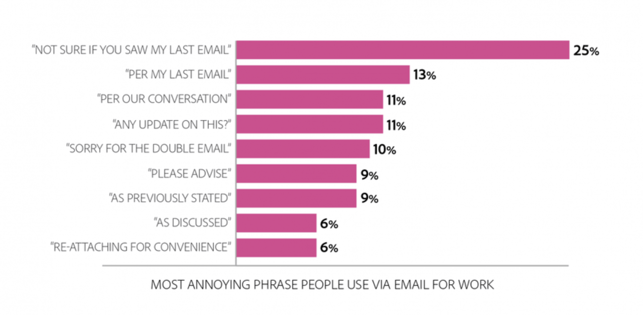People are more likely to trust you when you are direct with them.
And yet, the business world is replete with examples of frustratingly indirect language -- weasel words and passive-aggressive phrases that have become the default jargon of corporate America.
Weasel Words Are Possibly the Worst Words, People Say
"Weasel words" are words or phrases that allow a person to avoid speaking in a straightforward way. People use them in business because they are (1) inoffensive and (2) difficult to contradict. But they lose meaning in the process.
As the site Changing Minds puts it: "Weasels suck the eggs of birds through a small hole, leaving the egg appearing intact, but of course now having no real value."
Weasle words include:
- "arguably"
- "reportedly"
- "experts say"
- "research shows"
- "could be"
- "helps" ("helps prevent," "helps you look," "helps you feel")
- vague quantities ("many," "most," "everybody," "only a few")
- vague frequencies ("often," "only rarely")
- vague likelihoods ("possibly," "probably," "maybe")
- "people are saying" (had to throw that one in)
Many other words can be weasel words in specific contexts:
- Does your fluoride toothpaste prevent tooth decay ... or does it merely "fight" it?
- Is that gold coin real ... or a "genuine replica"?
One of the reasons salespeople are often met with skepticism is their use of weasel words. These words may protect you from making a false claim -- but they don't protect you from losing the buyer's trust.
I Don't Disagree That Passive-Aggressive Language Is Annoying
Another form of indirect language that proliferates in business settings is the passive-aggressive statement. This is when you have a problem or difference of opinion with someone, but are trying to still be professional and avoid conflict.
Pro tip: It doesn't work.
When you say "I don't disagree," that is not the same thing as saying you agree.
When you say "I was only joking," you were at least partially serious.
When you say, "Correct me if I'm wrong," you mean you're not wrong and the other person is.
When you email, "Any updates on this?" you mean, "Can you speed it up?"
When you email, "Please advise," you mean, "Get back to me already."
When you close with, "Thanks in advance," it means you are taking the other person for granted.
And while passive-aggressive business talk is meant to be inoffensive, the fact is your co-workers, clients and friends would trust you more if you said what was on your mind.
Per a recent Adobe survey, the following are the most annoying email phrases people use at work.

Note that every one of these phrases is passive aggressive.
You can be direct with people without being mean or hurting their feelings. Try that next time instead of using weasel words or passive-aggressive jargon.
Leave a Comment